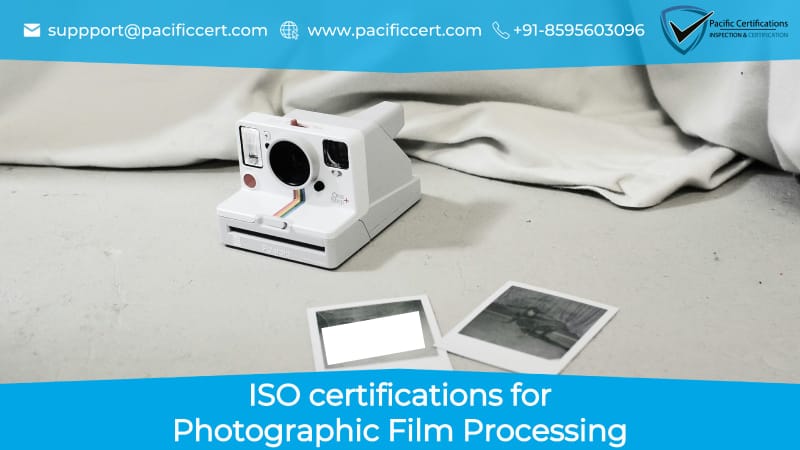ISO Certifications for Photographic Film Processing, Requirements and Benefits

In the rapidly evolving world of photography, maintaining high standards of quality and service in photographic film processing is paramount. Achieving ISO certification can significantly enhance a company's reputation and operational efficiency. For photographic film processing services, several ISO standards are particularly relevant.
Relevant ISO Standards for Photographic Film Processing Services
ISO 9001:2015 – Quality Management Systems:
It ensures that organizations meet customer and regulatory requirements and demonstrate continuous improvement. For photographic film processing, adhering to ISO 9001 can enhance service quality and customer satisfaction.
ISO 14001:2015 – Environmental Management Systems:
It provides a framework for effective environmental management. Implementing this standard helps companies minimize their environmental impact, comply with applicable laws, and achieve sustainability goals. For film processing businesses, this can involve managing chemical waste and reducing energy consumption.
ISO 45001:2018 – Occupational Health and Safety Management Systems:
It helps organizations prevent work-related injuries and illnesses and create a safe and healthy work environment. This is crucial for photographic film processing services, where employees might be exposed to hazardous chemicals.
ISO 27001:2022 – Information Security Management Systems:
This standard helps implement robust information security practices. For companies handling sensitive photographic data, ensuring the confidentiality, integrity, and availability of information is vital.
Click here to find out more applicable standards to your industry
How Pacific Certifications can help?
We at Pacific Certifications specialize in auditing and certifying companies against these ISO standards. Our role is to ensure your organization complies with the necessary requirements and achieves certification.
Our services are:
- Audit Services: Our experienced auditors will conduct thorough audits of your management systems to verify compliance with the relevant ISO standards. We assess your processes, identify areas for improvement, and ensure you meet all the necessary criteria.
- Certification Issuance: Upon successful completion of the audit, we will issue the ISO certification, demonstrating your commitment to quality, environmental responsibility, health and safety, and information security. This certification can enhance your market reputation and customer trust.
Market Research and Trends
In 2024, the photographic film processing industry is witnessing significant trends and developments:
- There is a growing emphasis on sustainability in film processing. businesses are adopting eco-friendly practices, such as reducing chemical usage and implementing recycling programs. ISO 14001 certification is increasingly becoming a benchmark for environmental responsibility.
- With the rise of digital technologies, film processing companies are integrating digital solutions to improve efficiency and service quality. This includes automated processing systems and enhanced data security measures, aligning with ISO 27001 standards.
- Post-pandemic, there is a heightened focus on occupational health and safety. Companies are investing in better safety protocols and employee training, making ISO 45001 certification more relevant than ever.
- As competition intensifies, maintaining high-quality standards is crucial. ISO 9001 certification helps companies streamline their operations and consistently deliver superior service, gaining a competitive edge in the market.
Achieving ISO certification is a strategic move for photographic film processing services aiming to enhance quality, environmental responsibility, health and safety, and information security.
For more information on how we can assist your company in achieving ISO certification, contact us at [email protected] today!
Requirements & Benefits of ISO certifications for Photographic Film Processing
ISO certifications offer a structured approach to enhancing quality, environmental responsibility, health and safety, and information security within photographic film processing services.
Below are the key requirements and benefits:
ISO 9001:2015 – Quality Management Systems
Requirements
- Establish a quality policy and set measurable quality objectives aligned with the company’s goals.
- Maintain documentation to support the quality management system (QMS), including procedures, records, and manuals.
- Identify and manage interrelated processes to achieve consistent and predictable results.
- Implement risk-based thinking to identify potential issues and opportunities for improvement.
- Understand and meet customer requirements to enhance customer satisfaction.
Benefits
- Consistently meet customer expectations and improve customer loyalty.
- Streamline processes and reduce waste, leading to cost savings.
- Gain a competitive edge by demonstrating commitment to quality.
- Foster a culture of continuous improvement through regular monitoring and evaluation of processes.
ISO 14001:2015 – Environmental Management Systems
Requirements
- Develop an environmental policy that reflects the company’s commitment to sustainability.
- Identify and evaluate the environmental aspects and impacts of the company’s activities.
- Ensure compliance with relevant environmental laws and regulations.
- Set objectives and targets for reducing environmental impacts and improving performance.
- Implement controls to manage significant environmental aspects.
Benefits
- Minimize waste, reduce emissions, and conserve resources.
- Stay compliant with environmental laws and regulations, avoiding fines and penalties.
- Reduce operational costs through efficient resource management and waste reduction.
- Improve the company’s image and attract environmentally conscious customers and investors.
ISO 45001:2018 – Occupational Health and Safety Management Systems
Requirements
- Establish a health and safety policy to protect employees and visitors.
- Identify hazards and assess risks to implement effective controls.
- Comply with occupational health and safety laws and regulations.
- Set measurable objectives for improving health and safety performance.
- Prepare for and respond to emergency situations to mitigate their impact.
Benefits
- Reduce the risk of workplace accidents and illnesses.
- Ensure compliance with health and safety regulations, avoiding legal issues.
- Enhance employee morale and productivity by providing a safe working environment.
- Lower costs associated with workplace injuries, illnesses, and insurance premiums.
ISO 27001:2022 – Information Security Management Systems
Requirements
- Develop a policy to manage and protect information assets.
- Identify information security risks and implement appropriate controls.
- Ensure compliance with information security laws and regulations.
- Implement measures to control access to information.
- Establish procedures for detecting, reporting, and responding to information security incidents.
Benefits
- Protect sensitive data from unauthorized access, breaches, and cyber threats.
- Comply with information security regulations and avoid penalties.
- Build trust with customers by demonstrating a commitment to information security.
- Ensure the availability and integrity of information, supporting business continuity.
Conclusion
ISO certifications provide photographic film processing businesses with a structured framework to enhance quality, environmental responsibility, health and safety, and information security. The requirements of these standards ensure that companies systematically address critical aspects of their operations, while the benefits lead to improved performance, compliance, and reputation.
Pacific Certifications is accredited by ABIS, in case you need support with ISO certification for your photographic film processing business, please contact us at [email protected] or +91-8595603096.
Ready to get ISO certified?
Contact Pacific Certifications to begin your certification journey today!
Suggested Certifications –
Read more: Pacific Blogs

